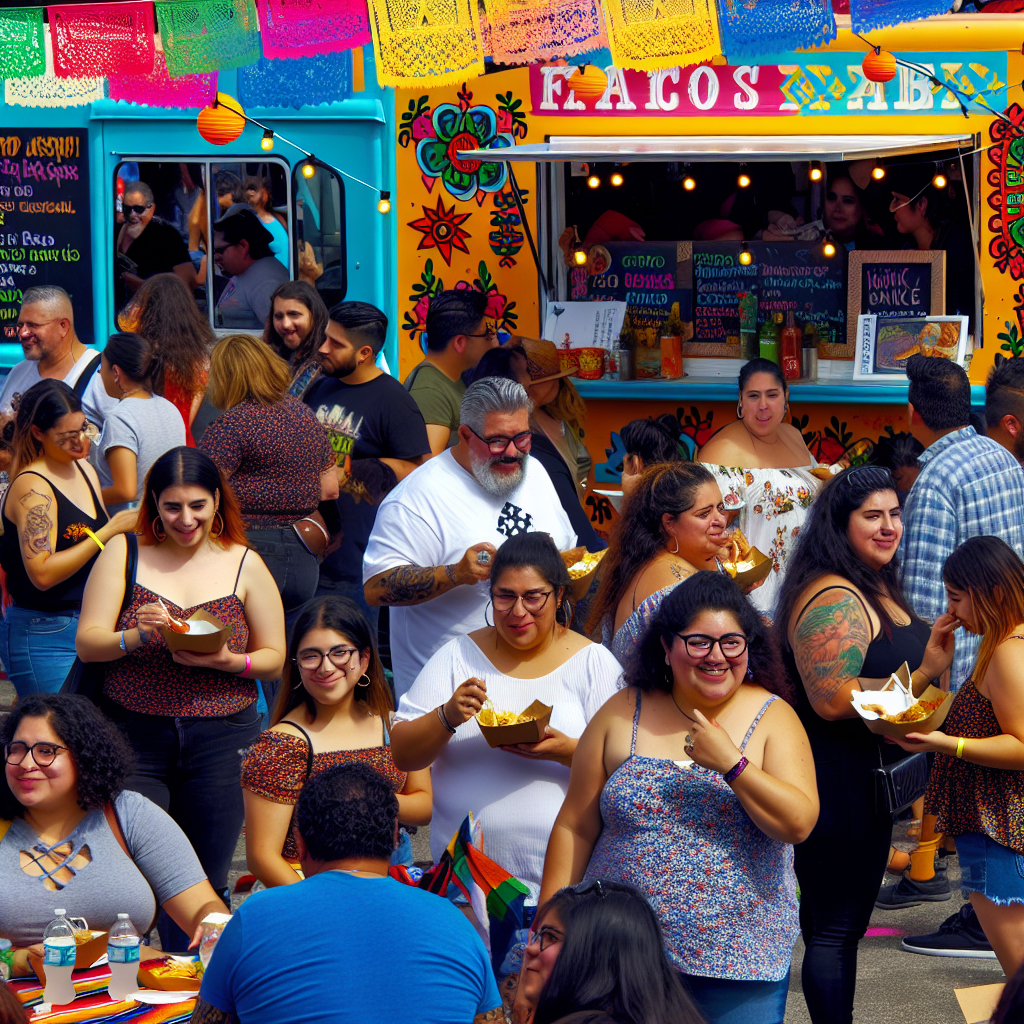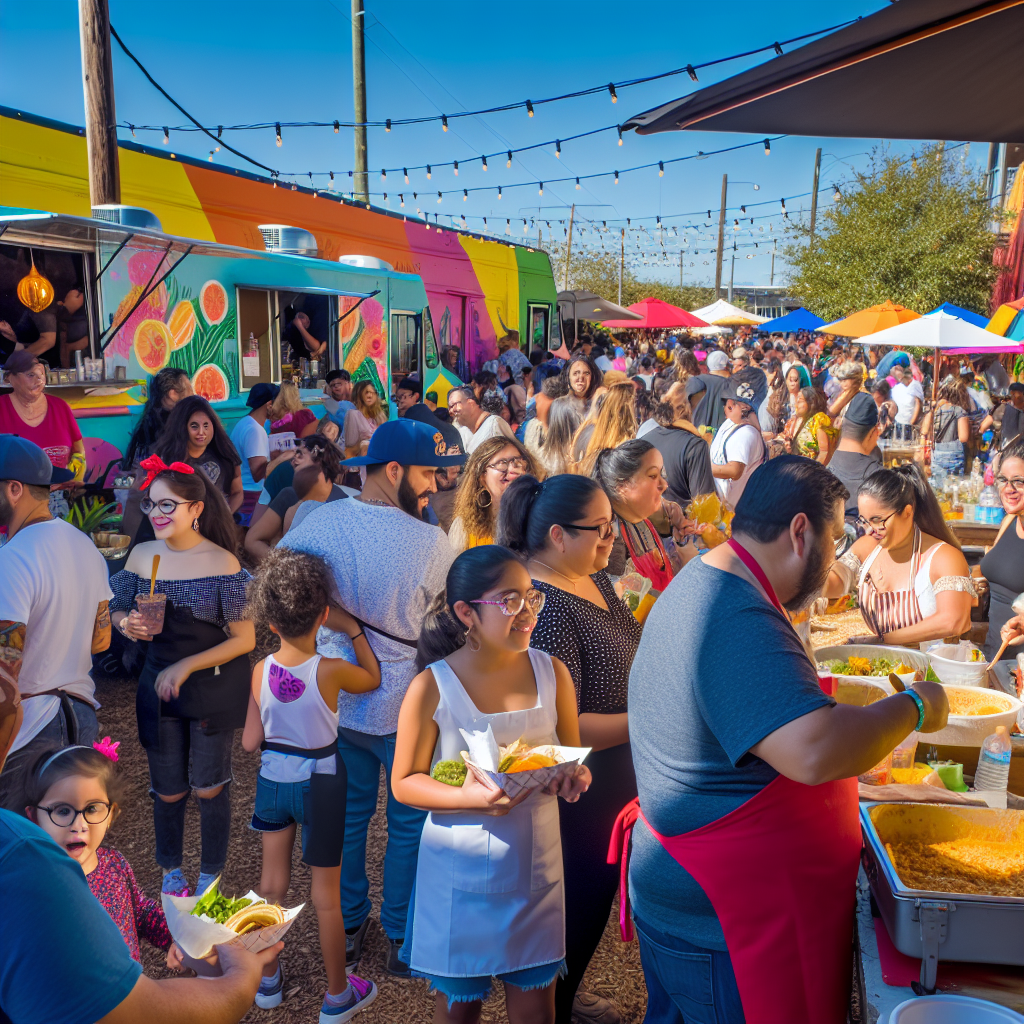In the bustling streets where the sun kisses the pavement and laughter fills the air, Latino food trucks emerge as vibrant beacons of culture and community. Each truck, a colorful canvas adorned with vivid artwork, serves not just food but a rich tapestry of stories and traditions.
As the tantalizing aroma of sizzling carne asada mingles with the sweet notes of churros dusted in cinnamon, patrons forge connections that transcend language barriers. Whether it’s the joy of discovering an unassuming taco truck tucked away in a corner or the excitement of waiting in line as the wheels of culinary creativity turn, every visit is a celebration.
Food truck culture becomes a bridge, drawing together diverse souls who partake in a feast of flavors, laughter, and shared memories. Here, every bite carries not only the taste of spices but the warmth of community and the spirit of heritage, making each experience profoundly significant.
Assessing Quality: The Heart of the Food Truck
User Testimonials on Latino Food Trucks
User testimonials showcase the excellent quality and overall dining experience at Latino food trucks. Here are three noteworthy reviews:
-
Caseras Sabor Real Food Truck (Chicago, IL):
“If you’re downtown and craving some good Mexican street food, Caseras Sabor Real is a great choice. I got 3 tacos—al pastor, steak, and chicken, plus a corn cup. The tacos were tasty, and the corn had a great mix of mayo, cheese, and chili powder. The service was quick, and the staff was friendly.”
This testimonial highlights the tasty tacos and quick service, reinforcing a strong sense of quality.
-
El Sabor Latino by Quick Stop Deli (Silver Spring, MD):
“El Sabor Latino has a wide menu of authentic Central American and Mexican dishes, known for their quality and large portions. The food truck is popular for its reasonable prices, making delicious Latin cuisine available to everyone.”
This review emphasizes the authenticity and portion sizes, showcasing the quality and value.
-
Taqueria Sabor Latino (Stillwater, OK):
“I am truly addicted to their chicken tacos. I eat there multiple times a week, and I’ve been doing it for over a year. The staff is nice too. I gladly spend my money on their amazing food and kindness, supporting local businesses.”
This shows consistency and a sense of community, reinforcing loyalty and showcasing quality through repeated visits.
These testimonials reflect a positive view of quality in Latino food trucks, highlighting flavorful dishes, fair prices, and welcoming service.
Exploring the Impact of Food Truck Culture on Pricing Trends
In today’s vibrant food landscape, the dynamic food truck culture significantly influences pricing trends, particularly seen with beloved offerings like street tacos. As these culinary on-the-wheels ventures grow in popularity, understanding their pricing mechanisms becomes essential for consumers and vendors alike.
Los Angeles
Taco trucks, or “Loncheras,” are a staple in the L.A. food scene. Catering costs typically range from $20 to $35 per person, making them an economically viable option compared to traditional catering rates of $70 to $85 per person. This price disparity drives the rise of food truck culture, with more patrons opting for the convenience and affordability of food trucks over sit-down restaurants.
The initial startup costs for a food truck can be as low as $50,000 to $100,000, which is significantly less than conventional restaurants, enabling aspiring restaurateurs to enter the market with ease. However, operational costs have surged due to inflation, with rising fuel and ingredient prices prompting some vendors to increase their menu prices or reduce portion sizes [source].
Chicago
Prices for street tacos in Chicago are notably affordable, usually ranging from $2.50 to $4.00 for traditional fillings like al pastor and carnitas. This competitive pricing not only attracts locals but also enhances the visibility of food truck culture, drawing in curious foodies from around the city. In contrast, dining in restaurants can see taco prices escalate to between $3.75 and $8.00, depending on the gastronomic experience. This clearly delineates the value proposition presented by food trucks [source].
One prominent food truck, La Cocinita Chicago, specializes in Venezuelan street food, offering customizable tacos that reflect the cultural diversity of Chicago, allowing customers to experience authentic dishes at reasonable prices [source].
Miami
In Miami, food truck catering can range from $12 to $35 per person, with minimum fees between $800 and $2,500 for larger events. Individual items like tacos or arepas typically fall between $10 and $15, making them a popular dining choice for both casual meals and formal gatherings [source].
Caja Caliente, a popular Cuban fusion food truck, showcases affordable options like pan con lechon for about $10. This highlights how food truck culture allows for diverse culinary experiences that are accessible, allowing customers to indulge without overspending [source].
Conclusion
As we transition into discussing the conclusions drawn from these pricing trends, it is clear that they play a pivotal role in shaping perceptions of value within the food truck industry. Pricing for Latino food trucks varies significantly across regions, driven by local market conditions and the cost of ingredients. The rise of food truck culture not only democratizes access to authentic flavors but also influences perceptions of value. Despite rising operational costs, Latino food trucks maintain competitive pricing, continually offering delicious street tacos and a vibrant dining experience. As demand grows, these food trucks adapt their pricing strategies to keep drawing in customers eager to savor the culinary traditions they represent.
| Food Truck Name | Location | Menu Options | Pricing | Customer Rating |
|---|---|---|---|---|
| El Chato Taco Truck | 5300 W Olympic Blvd, LA, CA | Carne asada, al pastor, tacos | $1.75 per taco | Highly rated |
| El Tauro Tacos Truck | 3108 Wilshire Blvd, LA, CA | Veggie quesadillas, nachos, loaded fries | Typical food truck prices | 3.0 (mixed) |
| El Churrascaso Grill | Kendall, Miami, FL | Grilled meats (churrasco, picanha) | $27.99 – $33.99 | 4.2 (positive) |
| Latinos Grill | 4300 NW 72nd Ave, Miami, FL | Grilled meats, wraps | $18.00 – $30.00 (parrillas) | Not specified |
| Lanchita’s Food Truck | 3190 SW 107th Ave, Miami, FL | Burgers, quesadillas, sandwiches | $14.00 – $18.50 (burritos) | 3.6 (mixed) |
Conclusion
In conclusion, the exploration of quality and pricing within the realm of Latino food trucks reveals a vibrant landscape brimming with cultural richness and culinary delight. The authentic flavors and generous portion sizes offer an unparalleled dining experience that balances taste with affordability.
With prices that often undercut traditional restaurants, food trucks provide access to delicious Latino cuisines without straining your wallet. This culinary movement not only supports local economies but also fosters community connections through shared food experiences.
As the food truck industry continues to thrive, so too does the opportunity for patrons to enjoy the warmth and vibrancy of Latino culture right from their neighborhoods. Whether indulging in tacos or churros, each visit to a Latino food truck is more than just a meal; it’s a celebration of heritage and flavor that truly enriches the community.
Customer Value: Is It Worth It?

Insights from Industry Experts on the Food Truck Industry
The following quotes from industry experts offer valuable perspectives on the food truck industry and highlight the significance of quality, pricing, and the consumer experience, particularly within the realm of Latino food trucks:
-
Dina Guillen, Director of Marketing for Jimboy’s Tacos:
“Research, research, research! As a marketing tool, I see a huge future for food trucks. The quality of food and service is independent of whether a truck is affiliated with a brick-and-mortar restaurant.”
-
Chef Zeferino Garcia:
“A business on wheels is always difficult—you have to be ready for anything… It’s harder than having an ordinary business.”
-
Andy Brennan, Market Analyst for IBISWorld:
“Food trucks are becoming more and more gourmet, and that’s a broad trend throughout the whole food service industry. This shift has led to higher prices but also increased quality and variety.”
-
Matthew Geller, CEO of the National Food Truck Association:
“Everything’s more expensive… Food truck owners are being very careful about how they waste that gas because every dollar that goes into your tank doesn’t go into your pocket.”
-
Jennifer Johnson, Co-Owner of Billionaire Burgers:
“We were continuously being shut down doing street pop-ups… It took us some time to figure out how to make a profit.”
These perspectives illustrate the multifaceted challenges and transformations within the food truck industry, especially related to quality and pricing.
Cultural Significance of Latino Food Trucks
Latino food truck owners across the United States are not only sharing their culinary traditions but also serving as vital community hubs. Their personal stories highlight the challenges they face and the cultural significance of their endeavors.
Personal Stories and Challenges
- Kimberly and Andres Nuñez transitioned from corporate careers to establish a successful food truck without prior culinary experience. They emphasized the importance of balancing family life with their business and adapted their menu based on customer preferences, removing less popular items to focus on top sellers.
- Maria Elena Lorenzo, an Afro-Mexican cook from Guerrero, Mexico, began by selling tamales from a cart in Los Angeles. She later expanded to a food truck and eventually opened “Tamales Y Elena Antojitos,” the first Guerrero-style Afro-Mexican restaurant in Los Angeles. Her journey underscores the challenges of introducing regional cuisines to new communities.
- Humberto Nieto fulfilled his dream of opening a restaurant in the U.S. by starting with a food truck serving authentic Mexican recipes. His establishment, The Flying Pepper Cantina in Bellefontaine, Ohio, has become a regional attraction, drawing visitors from as far as Columbus.
Cultural Significance and Community Impact
- In Sacramento, food trucks like Che’s Urban Eats and Ahuevo Foods are sharing authentic Argentinian and Peruvian-Mexican fusion dishes, respectively. Owners emphasize the importance of sharing their cultures through food, creating a sense of community and nostalgia among patrons.
- The Latino Food Truck Association in Philadelphia advocates for Latino mobile food entrepreneurs, aiming to eliminate systemic barriers and promote cultural pride. Their mission includes establishing a Food Truck Park as a cultural hub celebrating Latino heritage and driving economic empowerment.
- In Los Angeles, taco trucks, colloquially known as “Loncheras,” have become iconic symbols of Mexican culture. Predominantly owned by Hispanic and Latino families, these trucks serve as windows of opportunity for migrant families and prospective chefs, allowing them to stay connected to their heritage while adjusting to a new country.
These narratives illustrate how Latino food truck owners navigate challenges, preserve cultural traditions, and foster community connections through their culinary ventures.

